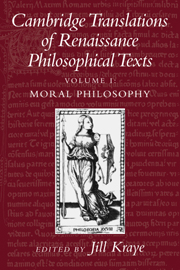Book contents
- Frontmatter
- Contents
- List of Translators
- Preface
- PART I CONCEPTS OF MAN
- PART II ARISTOTELIAN ETHICS AND THE SUPREME GOOD
- PART III ARISTOTELIAN ETHICS AND CHRISTIANITY
- PART IV PLATONIC ETHICS
- PART V STOIC ETHICS
- PART VI EPICUREAN ETHICS
- 20 Petrarch
- 21 Francesco Filelfo
- 22 Cosma Raimondi
- 23 Francisco de Quevedo
- Bibliography of Renaissance Moral Philosophy Texts Available in English
- Index Nominum
- Index Rerum
20 - Petrarch
Published online by Cambridge University Press: 05 June 2012
- Frontmatter
- Contents
- List of Translators
- Preface
- PART I CONCEPTS OF MAN
- PART II ARISTOTELIAN ETHICS AND THE SUPREME GOOD
- PART III ARISTOTELIAN ETHICS AND CHRISTIANITY
- PART IV PLATONIC ETHICS
- PART V STOIC ETHICS
- PART VI EPICUREAN ETHICS
- 20 Petrarch
- 21 Francesco Filelfo
- 22 Cosma Raimondi
- 23 Francisco de Quevedo
- Bibliography of Renaissance Moral Philosophy Texts Available in English
- Index Nominum
- Index Rerum
Summary
Introduction
Petrarch (Francesco Petrarca; 1304–74), who was crowned poet laureate in 1341, is deservedly regarded as the founding father of Italian humanism. Yet despite his groundbreaking contributions to almost every facet of the study of classical antiquity, he hardly deserves to be reckoned among the most original of moral philosophers. His most substantial and influential work in this field, On the Remedies for Both Kinds of Fortune (1366), is a vast encyclopedia of morally uplifting dialogues between Reason and the four emotions condemned by the Stoics: Joy and Hope, Sorrow and Fear. It contains a good deal of Stoic material taken from Seneca and Cicero, which is combined, often in a somewhat uneasy synthesis, with traditional Christian attitudes.
Petrarch's unfinished Memorable Matters, written between 1343 and 1345, was planned as a systematic and comprehensive account of the four cardinal virtues, illustrated by classical, medieval and contemporary exempla. Of this ambitious programme, however, only one quarter was actually carried out: what we have deals exclusively with prudence and its triple role as the memory of the past, the knowledge of the present and the foreknowledge of the future. We do not know what authorities Petrarch would have invoked to illustrate justice, courage and temperance.
The main interest of the text translated here resides in the fact that it is the first defence of Epicurus written by a Renaissance author. Petrarch was far from an enthusiastic supporter of Epicurus, regarding with contempt his belief that pleasure was the highest good and condemning the subordination of virtue to pleasure which this entailed.
- Type
- Chapter
- Information
- Cambridge Translations of Renaissance Philosophical TextsMoral and Political Philosophy, pp. 229 - 233Publisher: Cambridge University PressPrint publication year: 1997

